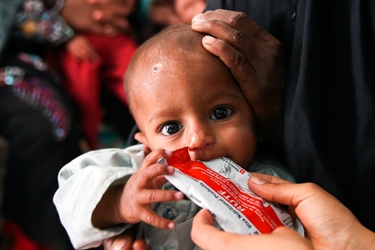Treating Acute Malnutrition: UNICEF

UNICEF has treated over one million children for severe acute malnutrition, with 400,000 of them alone in Nigeria in 2017.
Bamidele Omotola, a senior nutrition specialist at UNICEF’s Nigeria country office, discusses malnutrition in children. Notably, he references ‘early childhood development’ and highlights the critical importance of providing proper nurturing and care in the first 1,000 days of a child’s life.
Omotola further highlights the importance of preparing for birth in order to prevent chronic form of malnutrition, or ‘stunting’. This includes ensuring the mother eats well-prepared and nutritional food, as it is inherently consumed by the child too. With consequences of stunting including impaired brain development, it is truly concerning that 10 to 15 percent of Nigerian children are born stunted. Reducing the mother’s stress levels, as well as providing additional meals whilst still breastfeeding, are other methods to prevent stunting.
"There is also the issue of poverty, which is not only by money but also about knowledge." - Bamidele Omotola, UNICEF
Omotola explains that poverty is beyond financials, and rather also encompasses the issue of education and knowledge. The lack of adequate knowledge about the best health care for a baby amongst women results in the significantly high proportion of under-five deaths.
UNICEF provides both technical and financial support to North-East Africa and the government, including furthering their education systems by rebuilding their schools and ensuring children are actually sent to school. The organisation additionally provides feeding services for infants and young children and counseling and dietary information for mothers. A special micronutrients powder is also fed to children above six months to enhance their ability to enrich the food given to them.
Significantly, the UN Agency takes care to monitor the supplies they provide the governments (both material and financial) to ensure they genuinely reach the beneficiaries. They go further to highlight the issues of malnutrition and the consequences to governments, community leaders and organisations and other major stakeholders to encourage funding for nutrition.
Given their expenditure of over US $10 million in 2017 to nutrition in North-East Africa, UNICEF’s dedication to alleviating this crucial issue is apparent.
Child and maternal health, as well as innovations and technologies to support health SDGs, are some of the key topics being discussed at the 3rd annual Aid & Development Africa Summit, held in Nairobi, Kenya, on 27 – 28 February 2018.
View the Summit agenda at http://africa.aidforum.org/agenda for more topics and speakers.
Register your participation in the AIDF Africa Summit at http://africa.aidforum.org/register
If you’d like to stay informed on the latest updates in aid and development, please sign up for the AIDF newsletter.
Source: UNICEF













-115x71.jpg)
